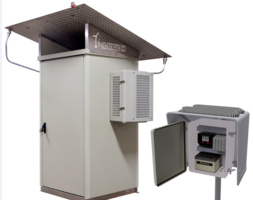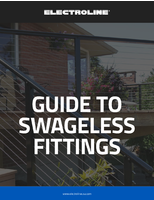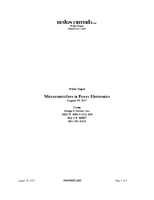New Tough Field Enclosures Fabricated from GRP Materials
Press Release Summary:

- Provides rugged dust and water-proof environments to protect remote control equipment located deep inside processing areas
- Eliminates need for large and costly plant buildings such as satellite instrument houses
- Simplifies roll-out of more distributed control architectures containing field equipment such as software-configured I/O, IIoT networking and PLCs
Original Press Release:
Tough Outdoor Enclosures Simplify Advanced Remote I/O Plant Control Architectures
Sarnia, Canada, August 7, 2019 --- Intertec Instrumentation is launching a range of tough field enclosures for housing remote I/O and other control and instrumentation electronics, featuring compact passive cooling to dramatically reduce costs of ownership. The new enclosures help EPCs and processing plant engineers to eliminate the need for large and costly plant buildings such as satellite instrument houses or remote instrument enclosures - which often need to be air conditioned and blast- and fire-resistant.
Fabricated from GRP (glassfiber reinforced polyester) materials, the enclosures provide rugged dust- and water-proof environments to protect remote control equipment located deep inside processing areas. Developed at the request of clients, the enclosure concept simplifies the roll-out of more versatile distributed control architectures containing field equipment such as software-configured I/O, IIoT networking and PLCs. The advance allows field control equipment enclosures to be assembled and sealed in the factory - an efficient and cost effective process - avoiding the need for opening and exposure to dangerous local conditions at the site during installation and operation.
The ability of Intertec GRP enclosures to be fabricated with embedded insulation (a monolithic sandwich with layers of GRP sheet enclosing insulation) is a major virtue. Insulation is commonly required because modern remote I/O applications use sensitive electronic devices, with lifetimes and reliabilities that are drastically reduced by overheating. Efficient insulation helps protect against temperature extremes. This is one reason why the simple steel cabinets widely used for cabling-related field junction boxes are not adequate for some of the more sophisticated remote I/O applications now being deployed.
Because of the electronic devices used, some form of cooling may also be required. If power is available at site, this can be in the form of conventional fan cooling. However, the temperature stability of highly insulated GRP boxes also makes it possible to efficiently exploit passive cooling techniques which require no electricity and have no moving parts - also making them suitable for deployment in hazardous areas. A tank of water plus a heat exchanger utilize the coolness of the night to moderate interior temperature during the day.
As many advanced remote I/O applications will - by their nature - be compact and small, Intertec has designed new passive cooling systems for smaller-sized cabinets and enclosures. These include a passive cooling system with a heat exchanger that doubles as a sunshade. The performance of the passive cooler can also be boosted by a small active element – such as a water cooler. Intertec can fabricate passively cooled field protection systems like this in enclosure and box sizes down to around 40 liters in volume. www.intertec.info
Background information on Intertec
Intertec produces protective enclosures for field-based equipment, using glassfiber reinforced polyester (GRP). This material offers remarkable advantages including natural corrosion resistance, low weight, extended durability for long life applications, much better thermal performance than metal – making it easier to insulate against heat and cold – and benign environments for wireless communications. A broad range of enclosures, cabinets and shelters, plus a comprehensive selection of accessories including heating and cooling components, protect against freezing, condensation, solar radiation/UV, explosion, fire, corrosion, impact, etc. Intertec has designed and shipped over a million instrument protection enclosures since 1965, to protect equipment operating in the most demanding operating conditions on Earth - from Arctic regions to deserts to harsh coastal and offshore environments. Application-specific protection may be configured using free software tools. Or, Intertec will configure a turnkey solution for clients, using know-how that has evolved over more than 50 years. Intertec designs and manufactures in Neustadt (Germany), Sarnia (Canada) and Houston (USA), and has an assembly and system building center in Russia. www.intertec.info.
For further information please contact either of the company's North American facilities:
Intertec Instrumentation Ltd, 255 Henry Drive, Sarnia, Ontario N7T 7H5, Canada. Tel: +1 888 875 8756; info@intertec-inst.com
Intertec Instrumentation, Inc., 11050 West Little York, Houston, TX 77041, USA. t: +1 832 554-1150; info@intertec-inst.com




